
Republicans, formerly known as Brazilian Republican Party and originally formed as the Municipalist Renewal Party is a Brazilian political party. Its electoral number, the numerical assignment for Brazilian political parties, is 10.

José Aldo Rebelo Figueiredo is a Brazilian politician and a federal deputy elected by the state of São Paulo. He was President of the Chamber of Deputies of Brazil from 2005 to 2007.
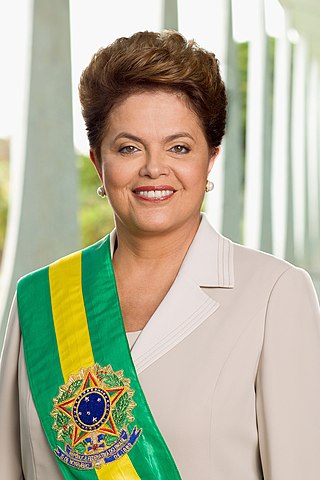
Dilma Vana Rousseff is a Brazilian economist and politician who has been the Chair of the New Development Bank since March 2023. Previously, she served as the 36th president of Brazil from 2011 until her impeachment and removal from office on 31 August 2016. She is the first woman to have held the Brazilian presidency. She also previously served as the chief of staff to former and current president Luiz Inácio Lula da Silva from 2005 to 2010.
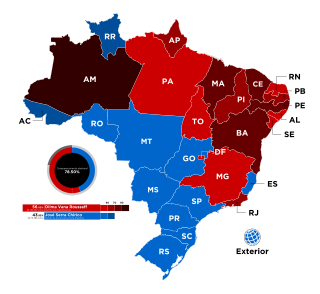
General elections were held in Brazil on 3 October 2010 to elect the president, National Congress and state governors. As no presidential candidate received more than 50% in the first round of voting, a second round was held on 31 October to choose a successor to Luiz Inácio Lula da Silva of the Workers' Party (PT), who was constitutionally ineligible to run for a third term as he has already served two terms after winning the elections in 2002 and being re-elected in 2006.
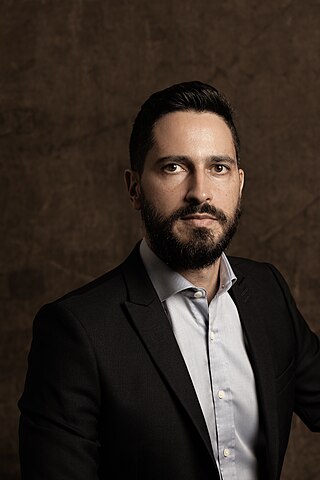
Ronaldo Lemos is a Brazilian academic, lawyer and commentator on intellectual property, technology, and culture.
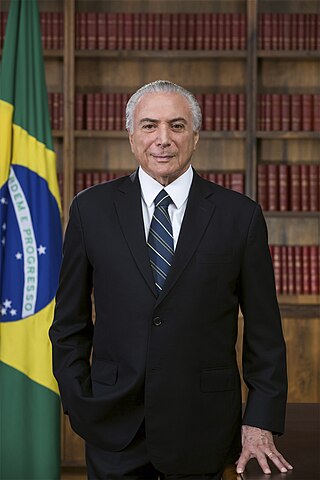
Michel Miguel Elias Temer Lulia is a Brazilian politician, lawyer and writer who served as the 37th president of Brazil from 31 August 2016 to 1 January 2019. He took office after the impeachment and removal from office of his predecessor Dilma Rousseff. He had been the 24th vice president of Brazil since 2011 and acting president since 12 May 2016, when Rousseff's powers and duties were suspended pending an impeachment trial.

General elections were held in Brazil on 5 October 2014 to elect the president, the National Congress, and state governorships. As no candidate in the presidential election received more than 50% of the vote in the first round on 5 October 2014, a second-round runoff was held on 26 October 2014.

Events from the year 2012 in Brazil.

In 2015 and 2016, a series of protests in Brazil denounced corruption and the government of President Dilma Rousseff, triggered by revelations that numerous politicians allegedly accepted bribes connected to contracts at state-owned energy company Petrobras between 2003 and 2010 and connected to the Workers' Party, while Rousseff chaired the company's board of directors. The first protests on 15 March 2015 numbered between one and nearly three million protesters against the scandal and the country's poor economic situation. In response, the government introduced anti-corruption legislation. A second day of major protesting occurred 12 April, with turnout, according to GloboNews, ranging from 696,000 to 1,500,000. On 16 August, protests took place in 200 cities in all 26 states of Brazil. Following allegations that Rousseff's predecessor, Luiz Inácio Lula da Silva, participated in money laundering and a prosecutor ordered his arrest, record numbers of Brazilians protested against the Rousseff government on 13 March 2016, with nearly 7 million citizens demonstrating.
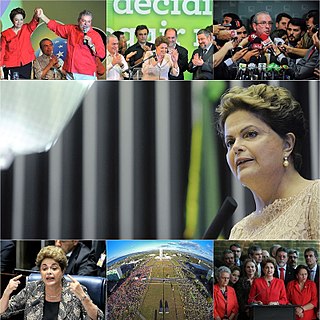
The impeachment of Dilma Rousseff, the 36th president of Brazil, began on 2 December 2015 with a petition for her impeachment being accepted by Eduardo Cunha, then president of the Chamber of Deputies, and continued into late 2016. Dilma Rousseff, then more than 12 months into her second four-year term, was charged with criminal administrative misconduct and disregard for the federal budget in violation of article 85, items V and VI, of the Constitution of Brazil and the Fiscal Responsibility Law, Article 36. The petition also accused Rousseff of criminal responsibility for failing to act on the scandal at the Brazilian national petroleum company, Petrobras, on account of allegations uncovered by the Operation Car Wash investigation, and for failing to distance herself from the suspects in that investigation.
Fiscal pedaling is a governmental creative accounting technique involving the use of state-owned banks to front funds required for paying general government obligations without officially declaring a loan, thus hiding these transfers from public scrutiny and delaying repayment from the Treasury to these banks. As such it is a kind of "overdraft" implying a positive balance sheet that does not really exist. Sometimes the term fiscal backpedaling is used.
Multistakeholder participation is a specific governance approach whereby relevant stakeholders participate in the collective shaping of evolutions and uses of the Internet.
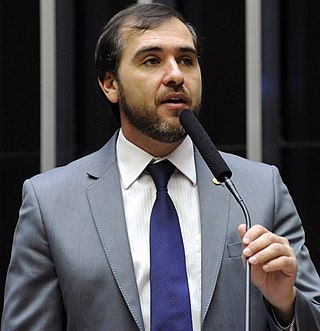
Jony Marcos de Souza Araujo more commonly known as Jony Marcos and Pastor Jony is a Brazilian politician and pastor. Although born in Mato Grosso do Sul, he has spent his political career representing Sergipe, having served as state representative since 2015.

Marcos Rogério da Silva Brito more commonly known as Marcos Rogério is a federal senator of Brazil representing his home state of Rondônia. He previously served in the chamber of deputies from 2011 to 2019.
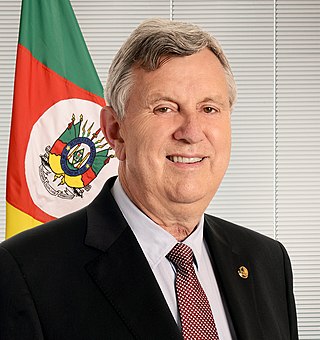
Luis Carlos Heinze is a federal senator of Brazil representing his home state of Rio Grande do Sul. He was previously served in the Chamber of Deputies from 1999 to 2019 and was mayor of São Borja from 1993 to 1996.

Marco Antônio Feliciano is a Brazilian politician as well as a pastor, writer, film producer, and theologian. He has spent his political career representing São Paulo, having served as federal deputy representative since 2011. A polarizing figure in Brazilian politics due to his outspoken conservative views, his election to president of the commission on human rights and minorities caused controversy and protest due to Feliciano's comments regarding Africans, LGBTQ individuals, women, Catholics, among others.

Jerônimo Pizzolotto Goergen is a Brazilian politician as well as a lawyer. He has spent his political career representing his home state of Rio Grande do Sul, having served as state representative since 2011.

Éder Mauro Cardoso Barra, better known as Delegado Éder Mauro or simply Éder Mauro, is a Brazilian politician and police chief. He has spent his political career representing Pará, having served as federal deputy representative since 2015.

Pedro Oliveira Cunha Lima is a Brazilian politician as well as a lawyer and writer. He has spent his political career representing Paraíba, having served in the state legislature from 2014 to 2019.
The Movement Come to the Streets is a Brazilian sociopolitical movement founded in October 2014. The movement emerged in October 2014 as an attempt to organize and unite people in the face of the 2014 Brazilian economic crisis during the Dilma Rousseff government. The movement focused on the government of the former president, the fight against corruption, the impeachment of Dilma Rousseff and the approval of the 10 Measures against Corruption, a bill of the Federal Public Ministry.
















